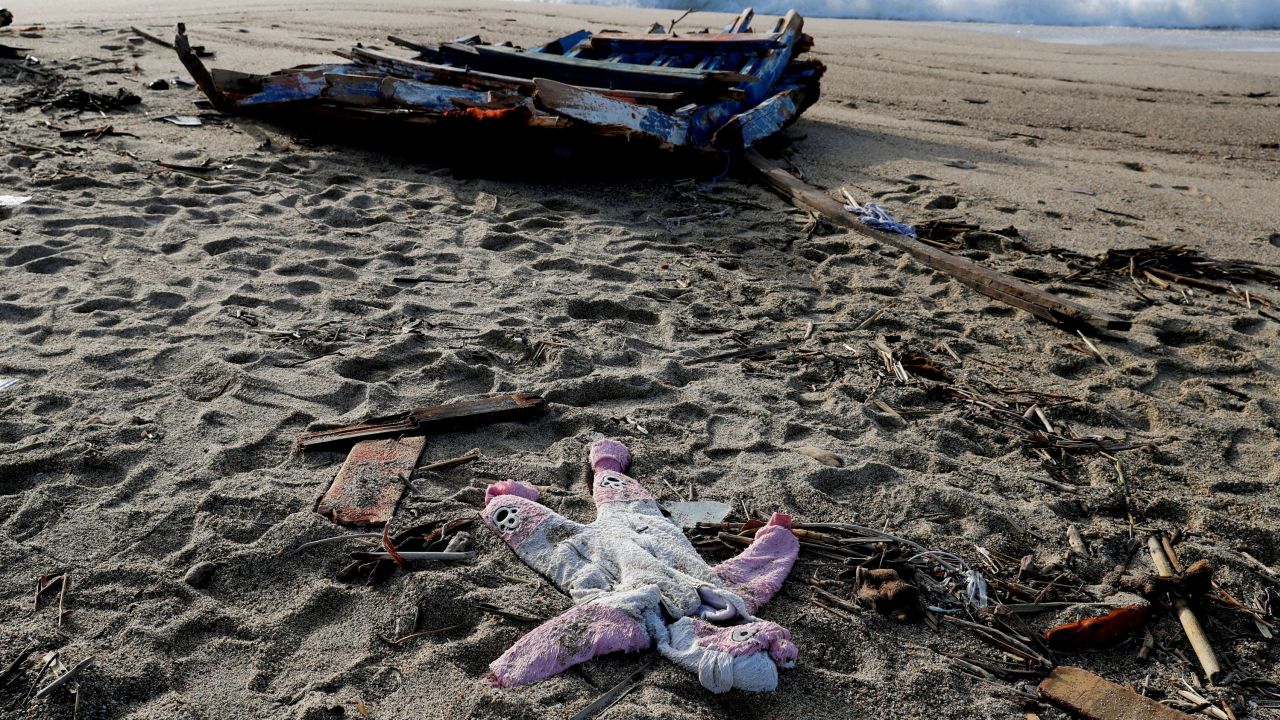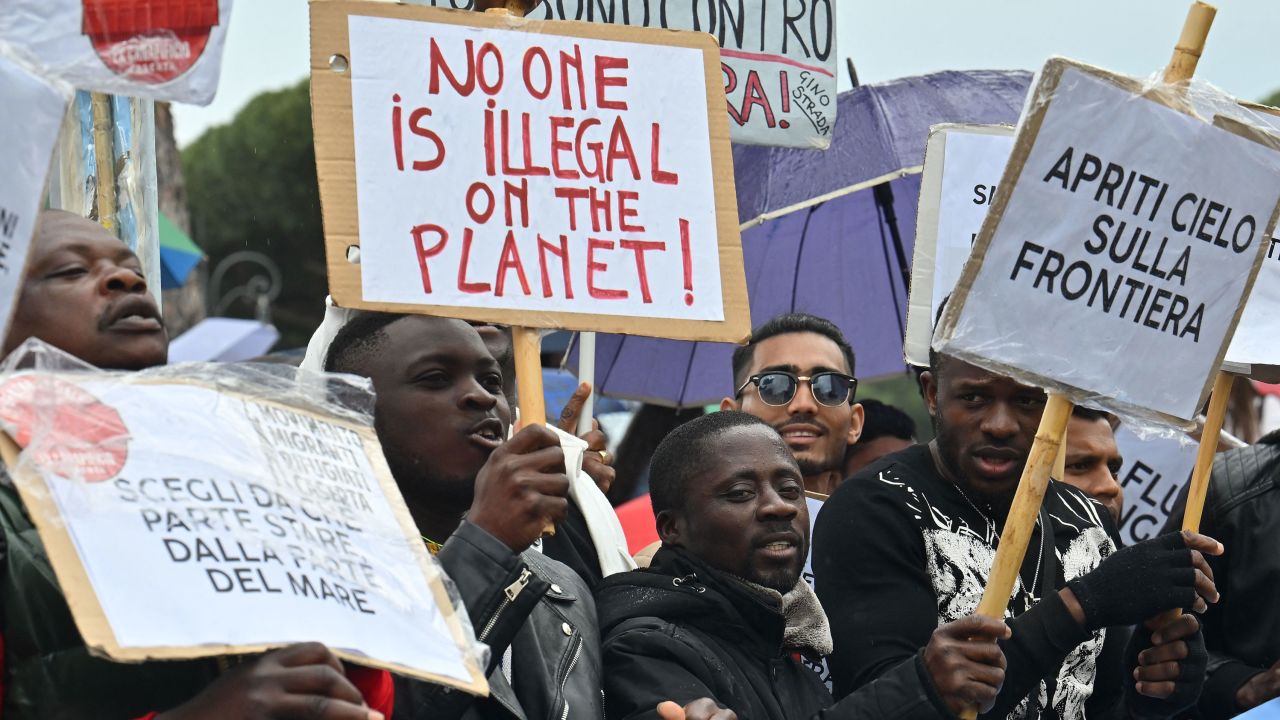Rome
CNN
—
The key campaign promise that brought Giorgia Meloni and her far-right coalition to power in a landslide victory in last September’s election was a vow to do what no one else had done before: stop migrant boats using Italy as a gateway into Europe.
“Blocco navale,” her social media screamed (“Naval blockade now!), complete with photos of overcrowded smuggler ships.
On the campaign trail she promised to halt all migrant boats from landing on Italian shores, no matter who was on them and what drove them to risk their lives.
Her first hundred days in office were deemed a success.
She was nowhere near as far-right as some had feared, and the multilingual career politician was at ease with global world leaders.
Liberal European leaders stood to gain from the prospect of Meloni’s promise to stop the boats, and many hoped she could pull it off. Conservatives like Hungarian leader Viktor Orban heralded her win, and thanked her for “protecting Europe’s borders.”
She even managed to bring wily coalition partners Matteo Salvini and Silvio Berlusconi in line despite differences over the war in Ukraine.
Meloni rode out several storms, including Berlusconi’s admission admitting he had rekindled his bromance with Vladimir Putin after he Putin sent over Russian vodka for his birthday. She sparred with Salvini over how to handle the energy crisis and his own affection for Putin. By late January, she seemed unstoppable.
Then the boats started coming, and coming, and coming.

By April 21, more than 35,000 people had arrived by boat, a number more than three times higher than the year before. By contrast, just over 4,000 people have arrived in the UK so far this year across by boat from France.
A recent poll showed that support for Meloni’s Brothers of Italy party – which won elections with 34 percent of the vote – has fallen to just over 29 percent in opinion polls.
Some believe that no one ever expected her to be successful stopping boats, so the drop in the polls reflects other issues, including her continued support for Ukraine and her relationship with China.
Italy has signed up to China’s Silk Road project, an ambitious, global infrastructure scheme some analysts view as a worrying sign of growing Chinese influence.
“Migrants and the EU are high on her watchlist, but there are other issues that threaten her more,” Francesco Galietti, founder of Policy Sonar, a Rome-based political risk consultancy, told CNN.
“Meloni will not be crippled by migrants, but if she can’t opt out of the Silk Road Agreement with China, and do it firmly, then she will not get an invitation to the White House.”
But not everyone is ready to give her a pass on migration.
“This is a serious issue, I think this is the most relevant crisis that she’s facing and the most relevant challenge for her government now,” Giovanni Orsina, director of the School of Government at Luiss Guido Carli University in Rome, told CNN, adding that she is addressing migration on two fronts: by putting pressure on Europe and by taking it very seriously at home.
He says to most Italians, the migrant crisis is still something they hear about, not something that impacts them directly.
“The turning point (is) when the migrants stop headlining the news and start becoming the people in front of their homes, you find them in the streets and squares in small Italian towns, then it becomes existential not abstract.”
Irregular migration into Europe has been one of the most divisive problems in the bloc for years.
But blocking boats on the last leg of the journey to Europe is essentially addressing a symptom of a problem, not the problem itself, Hanne Beirens, director of the Migration Policy Institute Europe, told CNN.

“If you ask migration experts if she could stop boats, the answer would be no,” she said, adding that the only thing that has ever stopped migration was the Covid-19 pandemic.
Beirens says that until Europe can agree together how to address the problem issue at the root, by offering opportunities to apply for asylum earlier in the journey and working to solve problems in countries that produce the most migrants and refugees, the boats will keep coming.
“There are high expectations with these promises, and when they are not able to manage a chaotic situation, we’ll see member states going it alone and deciding unilaterally to use pushbacks, violence at the border, or worse,” she says.
Meloni has done just that by declaring a state of emergency over the migrant crisis, which will allow extremely tough measures to handle arrivals, including allowing authorities that normally handle natural disasters to swiftly repatriate migrants.
Orsina says the state of emergency buys her time. “It also allows her to cut corners in Italian bureaucracy and it sends a message to the country that the problem is being tackled seriously, but it is also a way to better organize the people who come here.”
The measure is being boycotted in several left-leaning regions; Elly Schlein, the leader of the opposition Democratic party, likened the decree to something from the Fascist era.
Meloni’s election win was an astonishing moment in Italian politics, not only because of her party’s rapid ascent from the right-wing fringes.
She was not only Italy’s youngest and first female prime minister, she was also and its first elected leader since 2011, having won such a healthy majority that post-election politics as usual were put aside.
The people had spoken, and they wanted her and all she stood for.
Now whether she can follow up on her promises to voters is the question on everyone’s mind.